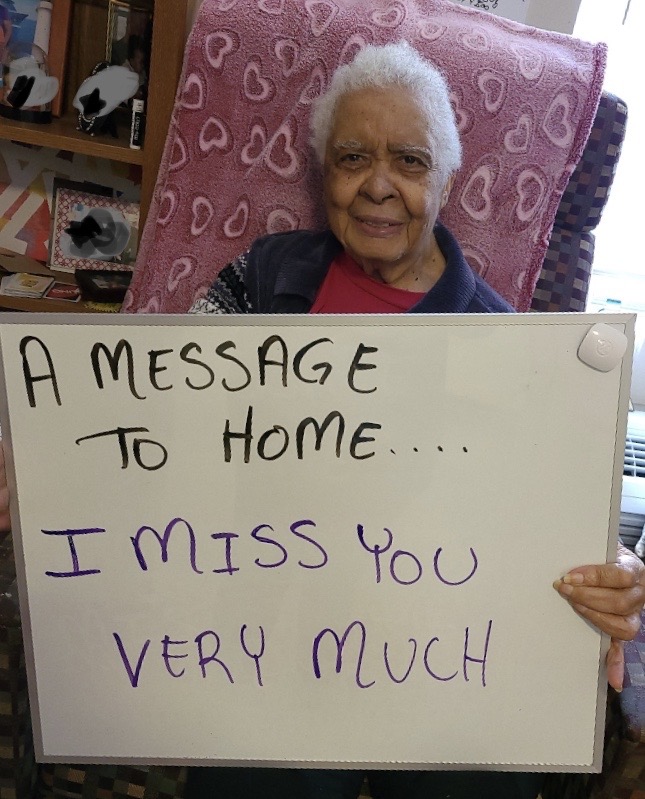DAYTON, OH - Tillie Day’s beautiful brown eyes looked blank into the glass window. Then there was terror. Distress. She holds a phone not knowing what to do with it. She cries, her worn hand covering her face.
She purses her lips and looks down as nursing staff try to get her to look up to see her daughter Deneen, a constant fixture on the other side of the glass.

That was Deneen Day’s experience as an Alzheimer’s caregiver with a mother in an assisted living facility. For four months, Day saw her mother decline. Tillie Day died on July 8, one week before her 83
rd birthday. Since the coronavirus pandemic began, people with Alzheimer’s and dementia have been dying in numbers higher than the five-year average for this time frame. According to Centers for Disease Control and Prevention data, there have been at least 31,047 more reported deaths due to Alzheimer’s or another dementia through September. That above average number far exceeds all other disease categories reported by the CDC, according to an Alzheimer’s Association analysis.
In Ohio, there have been 1,164 deaths above the average through September and that represents a 14 percent increase.
“This is alarming,” said Eric VanVlymen, Executive Director of the Alzheimer’s Association Miami Valley Chapter. “We must continue to push for the safety of people with Alzheimer’s both in the home and in facilities because we know they are more at risk.”
Reasons for the increased deaths are varied and VanVlymen said more research is needed to push to learn why. The Association has created guidelines to help protect those living at home from getting COVID-19 and guidelines to help long-term care facilities. They can be found at:
https://www.alz.org/
“Our state has taken measures to help deal with this, but it is terrible to see people with Alzheimer’s who already suffer to actually be burdened even more as well as their families,” VanVlymen said. He urged families with questions about care that can help protect their loved ones to call the Association’s 24/7 Helpline at 800.272.3900.
According to an AARP Nursing Home COVID-19 dashboard, more than 33 percent of Ohio nursing homes reported having less than a week's worth of PPE on hand over the four-week period ending Sept. 20, and some 35 percent of Ohio nursing homes also reported staffing shortages in direct care workers during this period. Both were higher than national averages.
Although Day said it was heartbreaking knowing she could not directly help her mother the way that she did prior to COVID-19, she was thankful for the staff and the hospice nurse assigned to her mom, who tried to compensate for the absence of family help. The staff “they became their family, they became their daughters, they became everyone to them,” Day said.
Currently 220,000 Ohioans live with Alzheimer’s disease. Nationwide, according to the 2020
Alzheimer’s Disease Facts and Figures report:
· Forty-two percent of residents in residential care facilities have Alzheimer’s or other dementias.
· Forty-eight percent of nursing home residents have Alzheimer’s or other dementias
“As an Association, we are here to support Alzheimer’s caregivers whatever their caregiving situation is,” said Pamela Myers, Program Director for the Alzheimer's Association. “Imagine how you would feel if you thought your parent was declining yet despite your strongest desires, you couldn’t touch them or advocate strongly in person for them.”
To document her COVID-19 caregiver journey and to honor her mother, Day created a five-minute video that started in March with window visits at her mother’s assisted living facility and ended after she died. “I wanted to be able to tell a story to honor others going through this to say ‘I see you. I get it.’” What people need to see and understand is “not just dying of COVID but dying during COVID and what families are going through,” she said.
Alzheimer's Association
The Alzheimer's Association leads the way to end Alzheimer's and all other dementia — by accelerating global research, driving risk reduction and early detection, and maximizing quality care and support. Our vision is a world without Alzheimer's and all other dementia.™ For more information, visit www.alz.org or call the 24/7 Helpline at 800.272.3900.